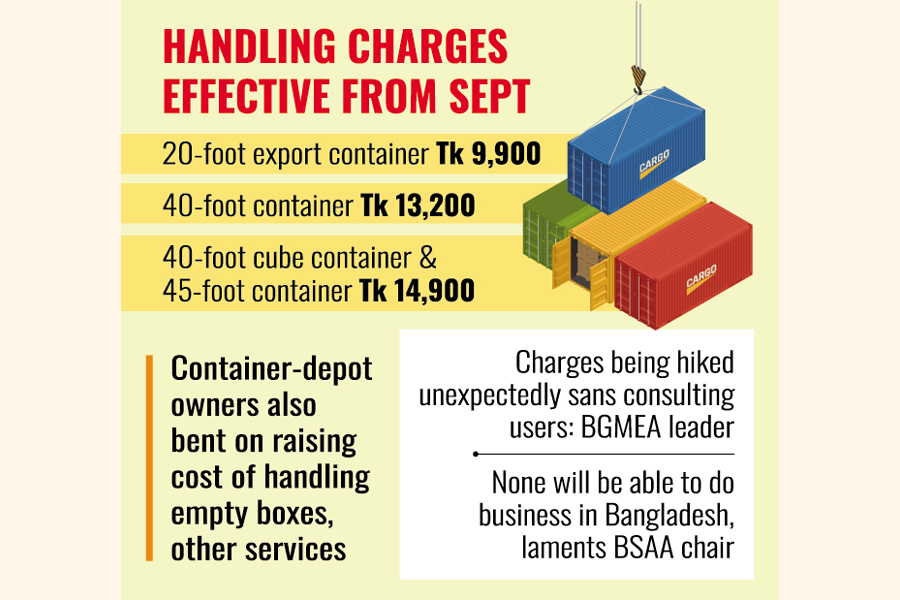EXPORTERS FEAR FRESH BLOW TO INDUSTRY, TRADE
Outbound container-handling charges set to surge 81pc

Published :
Updated :

Container-depot owners have announced a steep hike in charges of outbound goods-laden box handling up to 81 per cent which exporters term a fresh blow amid troubling reciprocal- tariff tussle with the United States.
Bangladesh Inland Container Depots Association (BICDA) has also declared the charge hike in case of handling empty cargo boxes and some other services they provide.
A circular issued by the BICDA says the hiked charges will be effective from September-in what comes as a double bind with a 35-percent additional US tariff on Bangladeshi exports possibly taking effect on August 01.
Bangladesh Garment Manufacturers and Exporters Association (BGMEA), the top user of the off-docks, says the move to raise charges will create a big pressure on the export-oriented industry.
The BICDA in its circular has said the investment cost of the Inland Container Depots (ICDs) has increased "so significantly" that capacity expansion of depots "has become very difficult".
"Similarly, the new ICDs are also struggling to attain financial viability and achieve full operational capability," says BICDA Secretary-General Ruhul Amin Sikder.
He says against the backdrop of significant operational and investment cost escalations, considerable increase in labour costs, increase in equipment import/purchase and maintenance costs, devaluation of the taka against the US dollar, sharp increase in overhead costs due to massive inflationary pressures, and increasing bank interest rates, BICDA has reviewed upward the empty-container-handling charges and export-cargo-handling charges.
According to the circular, from September 01, the ICDs will realise Tk 9,900 as handling charge for a 20-foot goods-laden export container, accounting for a 60-percent rise from the existing rate of Tk 6,187.
For a 40-foot container, the revised charge will be Tk 13,200 in a rise from the existing charge of Tk 8,250. The revised charge will go up by 81 per cent to Tk 14,900 from the present cost of Tk 8,250 in case of a 40-foot-high cube container and 45-foot container.
In case of empty boxes, the BICDA says, ground rate for a 20-foot container will increase from Tk 115 to Tk 150 while for 40-foot container it will go up from Tk 230 to Tk 300. Their lift-on/lift-off charges will be Tk 750 and Tk 700 respectively from the existing Tk 512.
The documentation charge will be increased to Tk 450 from existing Tk 276 for both 20-foot and 40-foot boxes.
The haulage charge will increase to Tk 2,500 from Tk 1,705 in case of 20-foot boxes while for 40-foot boxes the charge will rise to Tk 5,000 from existing Tk 3,410.
Also, BICDA is bent on raising CFS storage charges, labour charge, sorting charge, and reefer plug-in charge, among others.
Inamul Haq Khan, senior vice president, BGMEA, told the FE that depot owners were unexpectedly raising charges without discussing that with the main users of their facilities.
"They should have discussed with us whether we can absorb the higher charges or not."
Because, he says, if charges go up all of a sudden, it will create a big pressure on the export- oriented sector that is poised to face a tariff wall on the single-largest export market-the United States.
Mr Khan mentions that already there is another move to raise charges by the port authority.
"Our capability is getting reduced gradually," he says, adding that exporters are already under pressure over the proposed reciprocal tariff by the United States. "That is a matter of survival for us."
He laments it will be a "bad timing" for the industry as the depot association is raising charge when all are engaged with the United States in tariff negotiation.
Syed Mohammad Arif, Chairman, Bangladesh Shipping Agents' Association (BSAA), echoes the industry concern.
He says in the past, the depots had handled containers carrying only 38 items which now increased to 65 items, nearly doubled, which means they will make good business.
"This is not an appropriate time for them to increase charges when their business is growing. They should reconsider it now," he opines.
Mr Arif explains that ultimately, the charge will fall on export-import business of the country. "When tariff goes up, the principal would not bear it, rather they will realise it from exporters and importers that means from product prices."
On a greater note of concern, he says, "If the different authorities raise charges at once, none will be able to do business in Bangladesh."
And goods prices will go beyond the reach of all.
syful-islam@outlook.com


 For all latest news, follow The Financial Express Google News channel.
For all latest news, follow The Financial Express Google News channel.